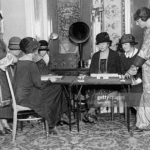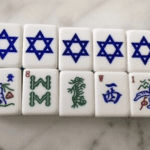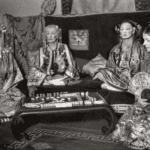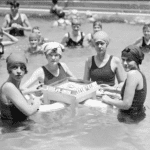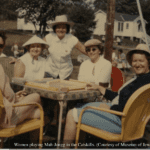Provocation: A series of archival images of Jewish-American women playing the Chinese game of mah-jong.
As a third-generation Chinese-Canadian who grew up surrounded by family and friends enjoying the game of mah-jong (my maternal grandmother taught me the basics when I was a kid, my parents had a regular Tuesday-night game with 3 other couples for decades, I still play the occasional game when visiting family in Victoria), I am resigned about the cultural appropriation and bizarre yellowface documented in these images of Jewish-American women playing the game; more than a little outraged (but not surprised) upon further research to discover that several white people made fortunes selling game sets and a trademarked Americanized version of play to their fellow Americans (ah, capitalism!) while Chinese in Canadian Chinatowns were being arrested for playing the game; yet also extremely curious as to how this game – so quintessential to community connection for Chinese Canadians in order to survive 19th- and 20th-century white supremacist British Columbia – became such a pastime and cultural touchstone for Jewish-American women.
An additional parallel or connection: my paternal grandfather is Hakka, one of the many ethnic groups of China, and I grew up understanding that he immigrated from southern China to Victoria, BC in 1900. However, just recently, my brother claimed that the Hakka were the “Jews of China”, as they are the only ethnic group without their own homeland or territory in China. This lack of territorial loyalty meant the Hakka were apparently entrusted with high-level court or government positions (mandarins), no matter who was in power. Obviously this is not the same experience as Jewish people in Europe; however, the theme of the lack of homeland – the sense of not truly belonging anywhere – is an ongoing aspect to my artistic explorations, and I am particularly interested in seed responses from artists with Jewish heritage.



